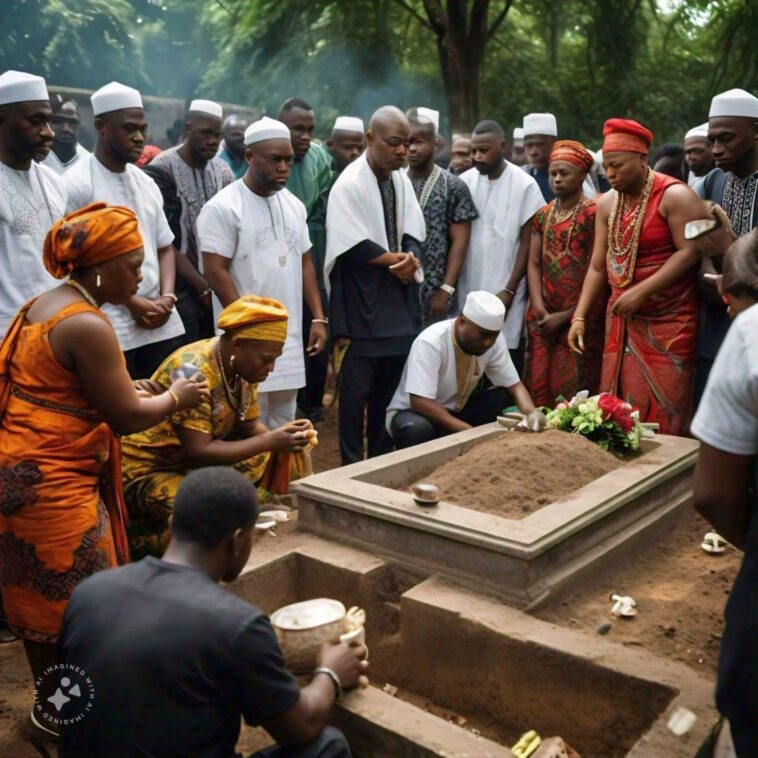The recent deaths of two brothers in my extended family, along with the subsequent burials and funeral rites, have led me to reflect deeply on the customs surrounding death and funerals in Igbo culture. These events prompted me to question our current burial practices and consider how traditional Igbo funerals were once conducted, with all their original meaning and significance.
Traditionally, in Igbo culture, funerals and burials were not rushed ceremonies completed in a single day. They often extended over two to four days, depending on the deceased’s status.
Only in cases of tragic death, such as the death of a very young person who has not achieved the least expected achievement of a member of a community (marriage and child birth), or where a person dies while his parents are still alive, are such persons buried on one day only, and no further rites carried out. In Igbo philosophy, it was believed that tragic events should not be dwelled upon, hence the adage, “ihe ọjọọ, adịghị ekwu ya ugboro abụọ” (evil things are not to be mentioned twice). Such burials were treated with solemnity, urgency and then left behind. There was no period of mourning afterwards.
As for other forms of death that constitute a taboo, for instance death by suicide, death of a person who committed some atrocity or death by a prolonged agonizing disease, such persons are not buried in the family vicinity. They are taken far away from the community and disposed of in such a way as to ensure that whatever evil that brought about such death stays far away from the home or community. Cleansing rituals are performed for those who would handle the corpse before and after such acts.
In the case of a “normal” death, where a respected community member who had lived fully and held titles passed away, funerals spanned several days. On the day of passing, it was customary to wait a few hours in case the deceased might “return”, reflecting a belief that individuals could cross into the spirit realm momentarily before coming back. This time given for possible revival also gives the immediate family the opportunity to rally round and inform the person’s nna ochie (mother’s maiden family), and other close family members. It also gives time to dig the grave and prepare the corpse for internment. Corpse were not kept in mortuaries or left to rot.
If the person had not revived by sundown, the immediate family would lay them to rest in a quiet, intimate burial within their home. Traditionally, only persons from the immediate family would handle the corpse, a practice that conveyed dignity and intimacy; “Ọ bụ nwanne ozu na-awụ ozu ahụ”.
After the burial comes the wake keep. On the night following a death, it is often difficult to sleep normally, so other close neighbors come around to keep the family company and prevent them from feeling completely lonely. This is the volition behind wake keeps. Another interesting thing is that these neighbors and well-wishers who come around don’t come to eat what the mourners cooked. They often come with their own food and this food is kept and served collectively. They don’t even allow the mourners to light a fire or do any chores. They help with all chores from washing to cleaning to serving or cooking food which they brought.
By the following day, news of the death spread more widely, and the various groups to which the deceased belonged—cultural or title societies—begin paying their respects. These groups did not expect to be hosted with feasts; instead, they came to celebrate the life and accomplishments of the deceased, telling stories that uplifted the grieving family.
If the deceased was highly regarded, some groups might require additional preparation time to perform appropriate rites, such as the appearance of a masquerade or other symbolic acts eg igbu efi. This often meant that funeral rites extended over several days. Only in the death of an Ọzọ titled man does the heir slaughter a cow for the Ọzọ title society as a last rite for his father and also marking his initiation and his replacement of his father in that Ọzọ title society. It was not a rite done for every man as is practiced today, only for those who took those special titles.
Today, compare what we now have as burials and funerals rites with what it used to be. Ask yourself why a lot of the things done the way they are done. Ask questions and no one will give you any justifiable and logical answer. You are expected to be satisfied with the answer: “This is the way things are done”.
Today, however, the essence of Igbo funerals has changed. Many families find themselves financially strained, trying to conduct “befitting” funerals that have become competitive social events. Funerals are now one of the few occasions that still bring people together. My own extended family rarely gathers except for funerals, and the camaraderie shared during these times is a reminder of the connections we have lost. One can only wish for other circumstances to bring us together, but sadly, it is usually death that calls us back.
We need to re-educate ourselves about the essence of these practices. Igbo culture—our Odinani—was once rooted in thoughtful, meaningful acts that resonated deeply with the community. Returning to this way of life is essential for preserving the true spirit of our heritage.
Written by:
Dr. Uwaomah Nsoffor
12/11/2024



